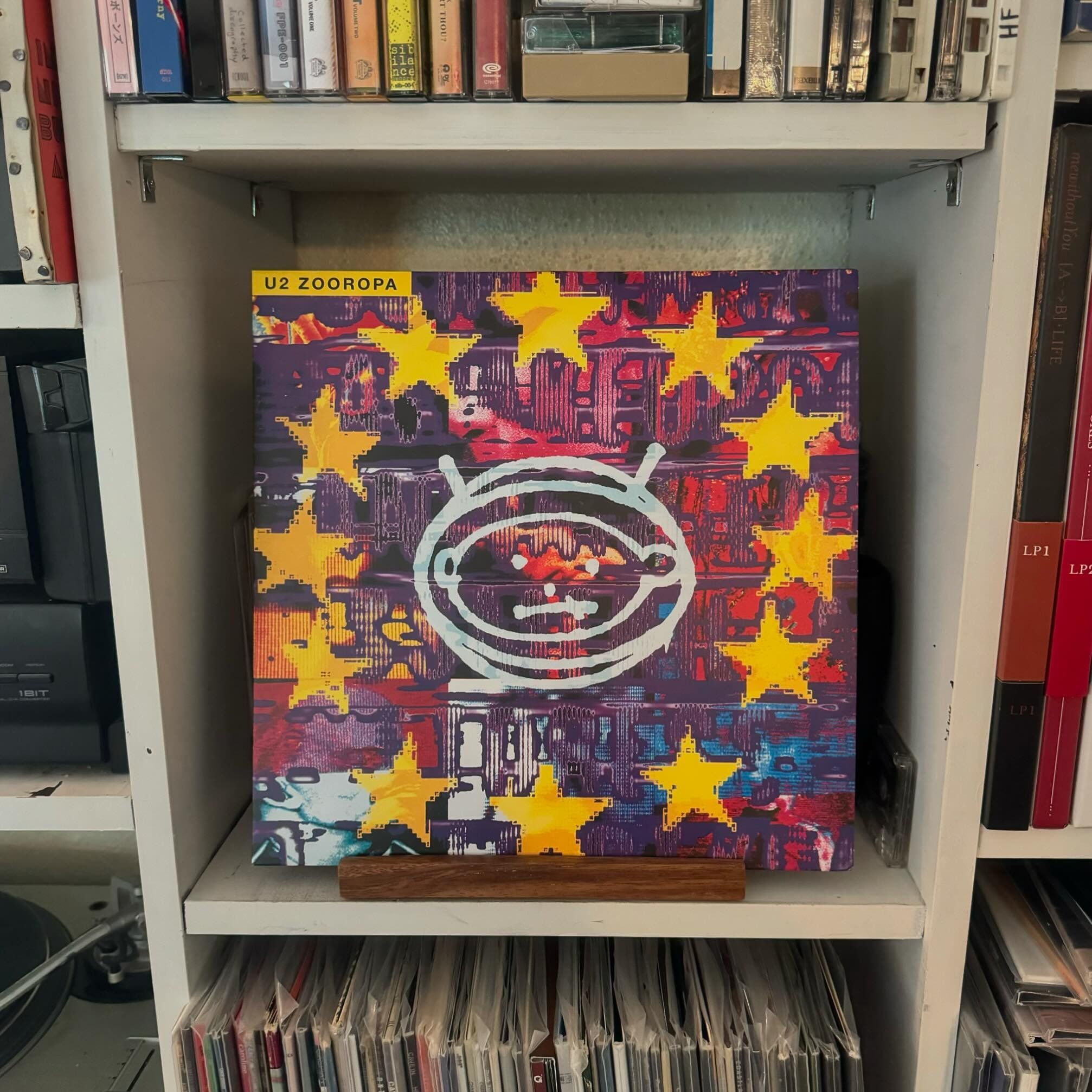
After having my perception of U2’s career shattered by the absolute bombshell that is Achtung Baby, I cast a suspicious glance at Zooropa. The only person I had ever heard speak positively about it said it was the only U2 album they liked, because it sounded nothing like U2. Other than that, it was used as a shorthand for how far the Irish post-punkers-turned-arena-heroes had gone off the rails. And coming online to U2’s existence around the time of All That You Can’t Leave Behind, even the band seemed to treat this record (and their 90s period in general) as an embarrassing and misguided detour.
So you can imagine my surprise when I found out it actually rules pretty hard.
On paper, there isn’t much to suggest that Zooropa isn’t a sort of “oh, and another thing” out of the creative energy that created Achtung Baby. The studio sessions were scheduled between legs of the Zoo TV tour and saw them digging even deeper into their experiments with electronic dance music and themes of media over-saturation that informed the record before it. Even the title of the album takes inspiration from that record’s opening track.
But the two records are as distinct as (noted U2 fans) Radiohead’s Kid A and Amnesiac. And just like the latter of those records, Zooropa has its own brand of wonderful weirdness that is unlike anything else.
On the surface, there’s not a lot to tie this to U2. Even for all of its left-turns, Achtung Baby still had plenty of patented Edge guitar and soaring Bono vocals to firmly attach it to their sonic identity. Zooropa on the other hand brings the experimental elements front and center. Edge’s guitar effects are so thick that it’s hard to discern what’s guitar and what’s synthesizer. Likewise, Larry Mullen Jr’s drums are processed so heavily that the line between live drums and samples is blurred. Adam Clayton’s bass grooves are funkier and more disco-inspired than anyone might guess coming from The Joshua Tree.
Bono’s delivery is stretched about as much as the band’s sound. His patented full-throated howl that created songs like “Sunday Bloody Sunday” and “Pride” is mostly absent. Instead, he spends most of the record either in a lower register croon or in an almost cartoonish falsetto that is still somehow cool as hell. The most U2-y song on the disc isn’t even sung by him.
This isn’t to say it’s a total sea change. For all of their mainstream appeal, U2 has always pushed into new sonic territory. Even tracks like “With or Without You” have a ton of weirdness bubbling beneath their pop sensibilities. And while Zooropa is the biggest push into pop music structures, there are still some classic U2isms. “Stay (Faraway, So Close!)” is the most straightforward thing on here, and one of the most emotionally moving songs in their catalog (hot take: it sounds like it could have been on OK Computer if you sub in Thom’s voice). Even though “The Wanderer” employs Johnny Cash for the lead vocals and uses a synth in place of a bass guitar, it’s not far from anything on The Joshua Tree.
Outside of the familiarity of those tracks though, there’s still plenty of gold to be found. The title track opens the record with a shapeshifting tour of their new sound. “Babyface” mixes Magical Mystery Tour-era Beatles with electronica to create what seems to be a tender lovesong until you realize it’s from the perspective of a guy pausing a nude scene on a VCR. “Numb” juxtaposes a one-note rapidfire vocal part by the Edge that’s arguably hip hop adjacent (it’s at least as close as “Subterranean Homesick Blues”). “Lemon” gives dystopian consumerism a space disco soundtrack. “Daddy’s Gonna Pay For Your Crashed Car” grooves so hard you’d be forgiven for needing to take advantage of the titular arrangement. “The First Time” puts a sardonic twist on the Prodigal Son story and sets it to an ambient wash of octave effects.
And as I’ve taken a more earnest look at U2’s career at large, I’ve been surprised to find that this record is quite beloved, even if it is on the other side of a generational divide. While OG fans and oldheads might dismiss it, I’ve seen a number of 90s kids lift it up as not only their favorite U2 record, but one of their favorite records of all time. And I have to say, I’ve become a believer. It might not supplant The Unforgettable Fire at the top of my list, but it is a masterpiece in its own right—and definitely not a misstep.
On a more personal note, “The Wanderer” has been a place of solace recently. I’ve made no secret of my deconstruction of American Evangelicalism to a broader interpretation of Christianity, and there’s been some collateral damage in certain relationships that has flared up again. This track has served as a comforting reminder that there is a long history of people earnestly seeking Jesus outside of the framework of the Western conservative worldview.